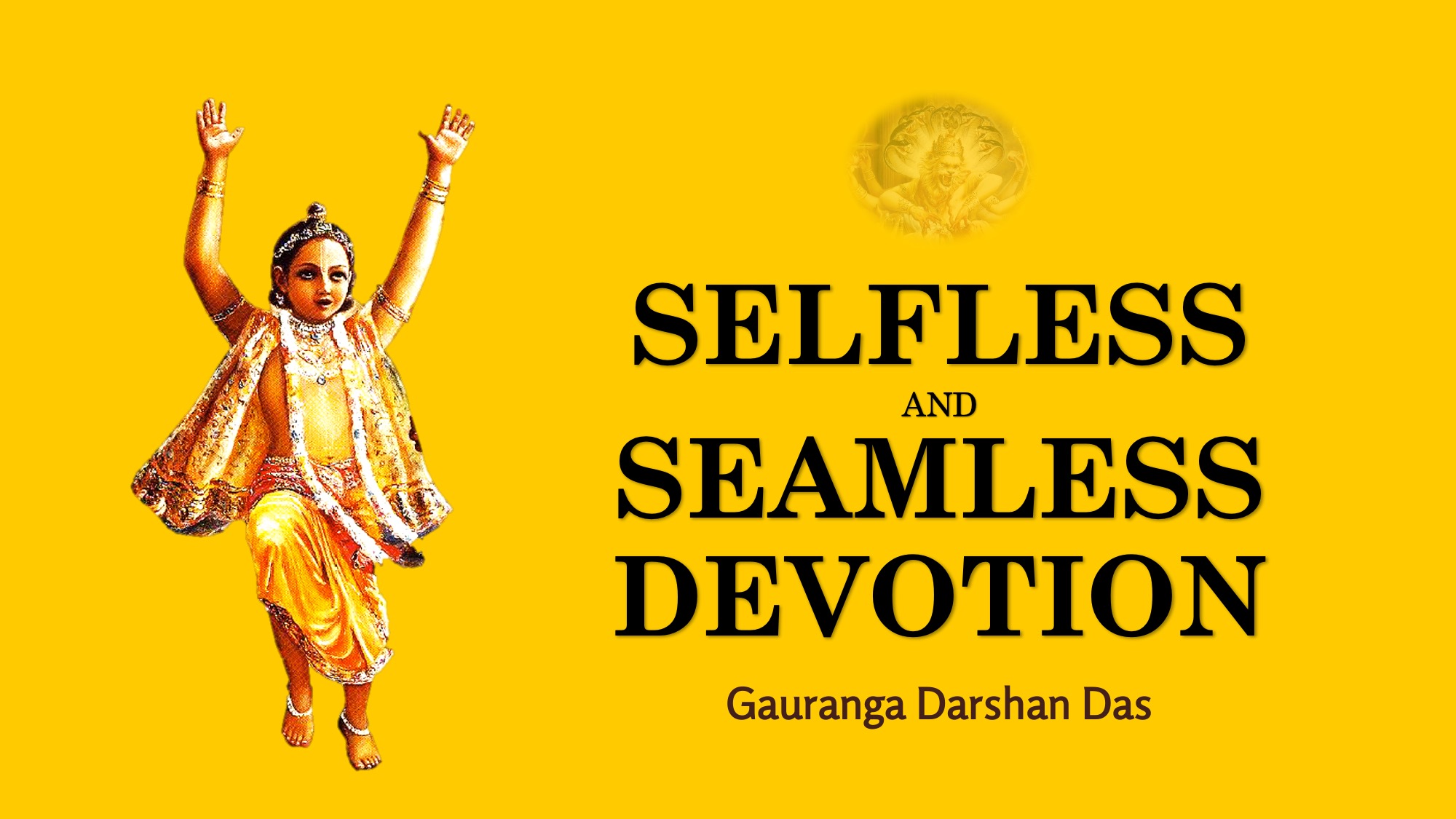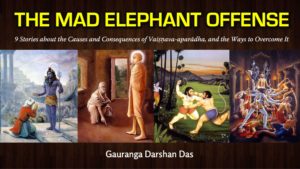Selfless and Seamless Devotion: Lessons from the Life & Character of Prahlāda
By Gauranga Darshan Das
Devotional service rendered to God with a materially unmotivated heart and with unwavering regularity completely satisfies the self.
Achieving anything in life requires focus and determination. If our efforts and attitudes are consistent, we can achieve our intended goals easily and quickly. But if our motives are impure and our endeavors distracted, our success is hampered. In spiritual life, pure intentions and consistent focus on the prescribed practices are of vital importance. The timeless scripture Śrīmad-Bhāgavatam(1.2.6) emphasizes this principle:
sa vai puṁsāṁ paro dharmo
yato bhaktir adhokṣaje
ahaituky apratihatā
yayātmā suprasīdati
“The supreme occupation [dharma] for all humanity is that by which men can attain to loving devotional service unto the transcendent Lord. Such devotional service must be unmotivated and uninterrupted to completely satisfy the self.”
Bhakti,or pure devotional service unto the Supreme Lord Kṛṣṇa or Viṣṇu, is described to be ahaitukiand apratihatā. Ahaitukimeans not to have any selfish agendas behind one’s spiritual practice. Apratihatāmeans not to have any interruptions or irregularities in the practice. Advancement and satisfaction in bhaktidepend on the purity of our intent and consistency of our attempt.
In this world, our devotion to God is often obstructed by obstacles of various types. When reversals come, spiritual seekers strive to remain focused in their devotion by deriving inspiration from exemplary devotees. A wonderful example of such causeless and ceaseless devotion to God is seen in the life of a young devotee named Prahlāda, whose story is told in Śrīmad-Bhāgavatam.
Transmission That Transcends All Barriers
Prahlāda was the son of a great demoniac king named Hiraṇyakaśipu. When Prahlāda was in the womb of his mother, Kayādhu, Hiraṇyakaśipu went to perform austerities to get boons from Lord Brahmā, the creator of the universe. In his absence, the demigods attacked the demons and arrested Kayādhu to kill her child after his birth. But Nārada Muni stopped the demigods and sheltered pregnant Kayādhu in his own hermitage.
Nārada Muni then taught Kayādhu the principles of spiritual life and the glories of devotional service unto the Supreme Lord Viṣṇu. But Kayādhu could not hear those teachings attentively, as she was anxious about her husband’s return and her child’s well-being. However, Prahlāda, who was still within Kayādhu’s womb, heard those divine instructions very eagerly, and that hearing resulted in his unflinching devotion to Lord Viṣṇu.
In a communication system, when the transmitter of a signal is potent and the receiver is perfectly tuned to the signal, the transmission of data takes place very effectively. Similarly, in spiritual communication, when the guru is an advanced devotee of Kṛṣṇa and the disciple is eager to receive knowledge and inspiration from the guru, the transmission of bhaktitakes place effectively. Because of Prahlāda’s spiritual eagerness, being in his mother’s womb with undeveloped senses was no barrier for him to receive the knowledge of bhaktifrom Nārada Muni.
Age, Caste, and Company Are No Bar
Hiraṇyakaśipu’s austerities were so extreme that Lord Brahmā descended from his planet and told Hiraṇyakaśipu to ask for a boon. Hiraṇyakaśipu asked Lord Brahmā to grant him immortality.
When Brahmā replied that he didn’t have the power to do so, Hiraṇyakaśipu asked him to grant him the boons of not meeting death from any living entity created by Brahmā, inside or outside a house, during the day or night, on the ground or in the sky, by any weapon, human, animal, demigod, snake, and so on. Obliged, Brahmā granted those rare boons. Confident that he had attained immortality by these boons, Hiraṇyakaśipu became very proud. Out of his hatred for Viṣṇu and falsely thinking himself to be the supreme controller, he stopped the worship of Viṣṇu in his kingdom and tormented Viṣṇu’s devotees in various ways.
Although Prahlāda was the son of this envious demon, Prahlāda himself had no demoniac tendencies or attachment to his father’s extensive property and influence. His heart was filled with love for Lord Viṣṇu, and as a result, the so-called privileges and pleasures of this mortal world seemed trivial to him.
Little Prahlāda, hardly five years old, was sent to the school where the children of demons studied politics and diplomacy under the materialistic teachers Śaṇḍa and Amarka. Prahlāda never liked those teachings and was steadfast in the teachings of bhakti-yogagiven by Nārada Muni.
Prahlāda’s birth in a demoniac family, his tender age, and the company of those who hated Lord Viṣṇu didn’t affect his devotion to Viṣṇu. When our internal consciousness is focused on our beloved objective, external obstacles cannot hamper our success. Though the external atmosphere is surcharged with nondevotional vibrations, a determined devotee’s inner atmosphere is saturated with love for God.
Generally, we are influenced by the people around us. But if we are determined and prayerful, we can transcend the influence of negative association and achieve our higher goals. Prahlāda, through his constant absorption in Lord Viṣṇu, effortlessly overcame every crisis.
Fearlessness in Facing Confrontations
Hiraṇyakaśipu once tested Prahlāda’s knowledge by asking him to repeat what he had learned from his teachers. Ignoring the topics taught by his materialistic teachers, Prahlāda fearlessly repeated the essence of the teachings of Nārada Muni, his real teacher. He instructed his powerful father that worshiping Lord Viṣṇu is in the best interest of every human being.
śrī-prahrāda uvāca
śravaṇaṁ kīrtanaṁ viṣṇoḥ
smaraṇaṁ pāda-sevanam
arcanaṁ vandanaṁ dāsyaṁ
sakhyam ātma-nivedanam
iti puṁsārpitā viṣṇau
bhaktiś cen nava-lakṣaṇā
kriyeta bhagavaty addhā
tan manye ‘dhītam uttamam
“Hearing and chanting about the transcendental holy name, form, qualities, paraphernalia and pastimes of Lord Viṣṇu, remembering them, serving the lotus feet of the Lord, offering the Lord respectful worship with sixteen types of paraphernalia, offering prayers to the Lord, becoming His servant, considering the Lord one’s best friend, and surrendering everything unto Him (in other words, serving Him with the body, mind and words) – these nine processes are accepted as pure devotional service. One who has dedicated his life to the service of Kṛṣṇa through these nine methods should be understood to be the most learned person, for he has acquired complete knowledge.” (Bhāgavatam7.5.23–24) Prahlāda fearlessly explained to his father that the materialistic way of life entangles one in this world but service to the devotees of Kṛṣṇa or Viṣṇu frees one from material contamination and elevates one to the spiritual platform.
Even when his teachers, Śaṇḍa and Amarka, chastised Prahlāda, he didn’t budge from his determination in bhakti. He fearlessly spoke the truth, which was against their philosophy of discriminating between people as friends and enemies. He said that every living being is a part of God and is His servant, and thus we are all one in quality.
Facing a fierce demon and boldly confronting his conceptions is not possible for an ordinary person. A tender child generally fears chastisement and punishment by a strict elder, but Prahlāda boldly opposed the demoniac philosophy of his teachers and Hiraṇyakaśipu, while simultaneously being humble and respectful to them. Fearlessness and humility are natural symptoms of surrender to God.
Even Deadly Dangers Do Not Matter
Enraged at Prahlāda’s staunch devotion to Lord Viṣṇu, hardhearted Hiraṇyakaśipu tried to kill Prahlāda. But Hiraṇyakaśipu couldn’t kill him by throwing him under the feet of big elephants, throwing him among poisonous snakes, employing destructive spells, hurling him from the top of a hill, conjuring up illusory tricks, imprisoning him, poisoning him, starving him, exposing him to severe cold, wind, fire, and water, and throwing heavy stones to crush him.
Throughout these extreme abuses and mistreatments, Prahlāda’s faith in Lord Viṣṇu and His protection didn’t diminish even slightly. Further, he absolutely had no bitter feelings towards Hiraṇyakaśipu, who tormented him in many ways. A devotee is ajāta-śatru: he is never hateful of anyone, even those who hate him.
Developing faith in God’s protection is very rare. Even after attaining some faith, we are tested by the inevitable calamities of this world and may become disturbed. Ordinary people lose faith in God’s protection or blame God for their difficulties. Śrīla Prabhupāda writes, “In case of benefit, no one will deny that it is God-sent, but in case of loss or reverses one becomes doubtful about how the Lord could be so unkind to His devotee as to put him in great difficulty.” (Bhāgavatam1.17.22, Purport)
Advanced devotees like Prahlāda accept even reversals as God’s blessings. Śrīla Prabhupāda writes, “A devotee’s conclusion is that no one is directly responsible for being a benefactor or mischief-monger without the sanction of the Lord; therefore, he does not consider anyone to be directly responsible for such action. But in both the cases, he takes it for granted that either benefit or loss is God-sent, and thus it is His grace.” (Bhāgavatam1.17.22, Purport)
Divine Teachings in the Demons’ Arena
The attempts to kill Prahlāda having failed, he was sent to school again. When his classmates called him to play in the absence of their teachers, Prahlāda spoke to them in sweet words about the futility of material life.
Prahlāda told them that we shouldn’t waste the rare and valuable human life for sense gratification and get entangled in materialistic family affairs. Human beings should perfect their lives by worshiping the infallible Supreme Lord with bhaktiright from childhood. Nothing is unobtainable when Lord Viṣṇu is satisfied. The pure spirit soul gets entangled due to material intelligence. Bhakti, or devotion to Lord Viṣṇu, is the best path to disentangle the soul from material existence. Thus Prahlāda urged his classmates to take to viṣṇu-bhakti.
Prahlāda’s gentle demeanor attracted all his schoolmates, who were not very much contaminated by their materialistic surroundings. They loved Prahlāda’s teachings and rejected the instructions of Śaṇḍa and Amarka. Just as Nārada Muni’s pure teachings had inspired Prahlāda although he was within his mother’s womb, Prahlāda’s pure teachings inspired his schoolmates although they were mere children and the sons of demons. Inspiration in bhaktiflows effectively when the hearts of both the proponent and the recipient are pure.
After All, It’s the Power of God
Śaṇḍa and Amarka reported to Hiraṇyakaśipu about Prahlāda’s activities in school, and Hiraṇyakaśipu became furious. Perplexed about how his five-year-old boy could be so fearless, Hiraṇyakaśipu asked Prahlāda, “My son Prahlāda, you rascal, you know that when I am angry all the planets of the three worlds tremble, along with their chief rulers. By whose power has a rascal like you become so impudent that you appear fearless and overstep my power to rule you?” (Bhāgavatam7.8.6)
Prahlāda replied that the source of his strength was also the source of Hiraṇyakaśipu’s. That source – Lord Viṣṇu – is the original source of all kinds of strength for every single being.
An advanced devotee is convinced that every living being is ultimately dependent on the Supreme Lord’s power. Without the Lord’s sanction, not a blade of grass moves.
When we love someone, we feel that person’s presence always and everywhere. A devotee who is in love with the omniscient Godhead sees Him everywhere at all times. On the other hand, an atheistic person devoid of love of God cannot see Him anywhere and doesn’t believe in His existence. Although having no qualification to see God, such a person challenges the devotees to show God.
Hiraṇyakśipu threatened to kill Prahlāda and challengingly asked him if his God was present in a pillar in the assembly hall. Knowing the all-pervading nature of the all-powerful Supreme Lord, Prahlāda firmly said, “Yes!” Hiraṇyakaśipu struck the pillar in rage. To prove true the declaration of His devotee Prahlāda that God is all-pervading, the Supreme Lord Viṣṇu appeared from the pillar in an unprecedented form as Nṛsiṁhadeva, half man and half lion.
After enjoying fighting for some time, Lord Nṛsiṁhadeva placed Hiraṇyakaśipu on His lap and killed him at sunset, in the doorway, merely with His nails. Although He is not obliged to do so, the Supreme Lord Nṛsiṁhadeva respected the benedictions that Brahmā had given to Hiraṇyakaśipu. The demigods celebrated the Lord’s victory and arrived on the scene to offer prayers to Lord Nṛsiṁhadeva.
Accomplished but Not Arrogant
None of the demigods’ prayers could pacify the angry Lord Nṛsiṁhadeva, however, and even Lakṣmī Devī, the Lord’s eternal consort, was afraid to approach Him. Then Lord Brahmā requested Prahlāda to pacify Nṛsiṁhadeva.
Although Prahlāda was chosen to pacify the Lord when all the great demigods and sages had failed to do so, he didn’t feel superior to them. A humble Vaiṣṇava who is fully qualified to serve the Lord still thinks himself extremely low. He is never falsely proud of his qualifications. Prahlāda prepared himself to offer prayers to the best of his ability, for his own purification.
In his heartfelt prayers, Prahlāda showed his deep humility, devotion, eagerness for shelter, fear of conditioned life, compassion for the fallen souls, knowledge of the Godhead’s unlimited opulence, and gratitude towards his guru, Nārada Muni, who had taught him bhakti. In his prayers, Prahlāda indirectly indicated and directly declared that bhaktiis the ultimate refuge and that material opulences are futile.
manye dhanābhijana-rūpa-tapaḥ-śrutaujas-
tejaḥ-prabhāva-bala-pauruṣa-buddhi-yogāḥ
nārādhanāya hi bhavanti parasya puṁso
bhaktyā tutoṣa bhagavān gaja-yūtha-pāya
Prahlāda Mahārāja said: “One may possess wealth, an aristocratic family, beauty, austerity, education, sensory expertise, luster, influence, physical strength, diligence, intelligence, and mystic yogic power, but I think that even by all these qualifications one cannot satisfy the Supreme Personality of Godhead. However, one can satisfy the Lord simply by devotional service. Gajendra did this, and thus the Lord was satisfied with him.” (Bhāgavatam7.9.9)
It’s Not a Business Transaction
Lord Nṛsiṁhadeva was very pleased with Prahlāda’s prayers and told him to ask for any benediction he wanted. Considering material benedictions to be impediments in bhakti-yoga, Prahlāda asked Nṛsiṁhadeva not to tempt him with boons. He told Him that he wasn’t a selfish merchant, trading his devotional service for some material benefit.
Prahlāda said, “A servant who desires material profits from his master is certainly not a qualified servant or pure devotee. Similarly, a master who bestows benedictions upon his servant because of a desire to maintain a prestigious position as master is also not a pure master. O my Lord, I am Your unmotivated servant, and You are my eternal master. There is no need of our being anything other than master and servant. You are naturally my master, and I am naturally Your servant. We have no other relationship. O my Lord, best of the givers of benediction, if You at all want to bestow a desirable benediction upon me, then I pray from Your Lordship that within the core of my heart there be no material desires.” (Bhāgavatam7.10.5–7)
Prahlāda then requested the Lord to excuse his father, and the Lord said that Hiraṇyakaśipu had been purified along with twenty-one generations of his ancestors.
Thus Prahlāda serves as an unparalleled ideal example of selfless and seamless devotion unto Lord Viṣṇu. By the mercy of Nārada Muni, Prahlāda received the seed of bhakti, and by performing bhaktiwithout motivations and interruptions, he became exalted, experiencing the bliss of bhaktiwithin himself at every moment.
Progress in bhaktidepends on the intent and intensity of one’s practice. One who performs bhaktiwith selfish motivations and undue interruptions cannot experience the intended pleasure of the heart. Both a candle and a 2000-watt bulb can light a dark room. But the dim candle flame illuminates a corner of the room, while the bulb illuminates the entire room. Similarly, if one’s practice of bhaktiis weak and wavering like the dim flame of a candle, one cannot derive the full pleasure that bhaktican offer. On the other hand, if one’s performance of bhaktiis as powerful as a 2000-watt bulb, one experiences the full bliss of bhakti. Therefore, seeking inspiration from the character of little Prahlāda, let us take our baby steps to intensify our absorption in the practice of devotional service.
This article published in the Back to Godhead International edition in Nov Dec 2020: http://btg.krishna.com/selfless-and-seamless-devotion-lessons-life-and-character-prahlada
Gauranga Darshan Das, a disciple of His Holiness Rādhānāth Swami, is dean of the Bhaktivedānta Vidyāpīṭha at ISKCON Govardhan Eco Village (GEV), outside Mumbai. He has written the Subodhinī series of study guides and other books, includingDisapproved but not Disowned andBhāgavata Pravāha. He teaches scriptural courses at several places in India and oversees the deity worship at GEV.




